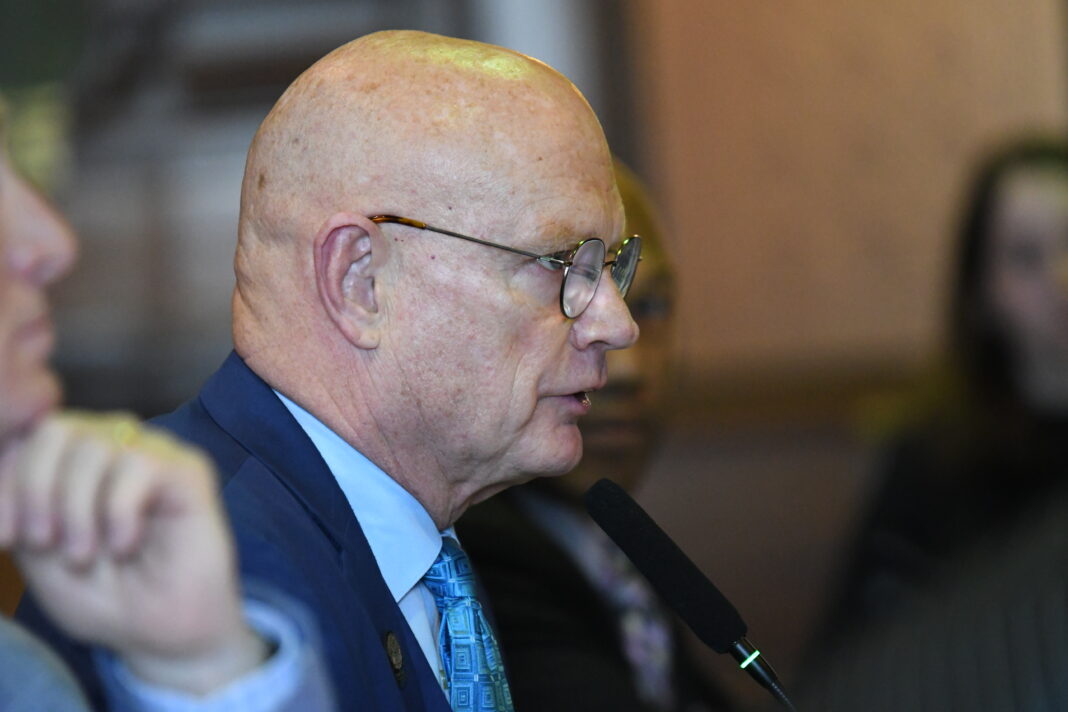Iowa House Judiciary Committee Republicans advanced a bill on Thursday that would prohibit cities and counties from providing guaranteed income programs. House Study Bill 552 was amended in committee to allow the current program offered in central Iowa to extend through Jan. 1, 2025.
Democrat State Rep. Beth Wessel-Kroeschell said the current plan – UpLift – should be allowed to run its course and be studied. Programs such as UpLift strive to reduce the impact of poverty, she said.
“I would like to respectfully disagree that this bill is necessary,” Wessel-Kroeschell said. “We have Iowans who are so passionate about serving low-income workers and I respect their work and their passion.”
The $500 a month each participant is receiving can ease the stresses of poverty, Wessel-Kroeschell said.
“Sometimes I think it’s hard for us to imagine all the challenges that come from living on a low income,” she said. “It might allow a family to buy or rent a saxophone for a child.”
That child may find their sense of belonging in school by playing the saxophone, she said.
Republican State Rep. Brian Lohse said that the programs violate all of the rules he learned about free market economics and capitalism. Lohse said such programs also don’t necessarily help the person receiving the income, but he compared these local programs to SNAP, which is food assistance provided from the state and federal governments.
“More importantly, these are tax dollars being spent at the city and county level,” he said. “It’s not state tax dollars, it’s property tax dollars. And for that reason, I’m voting no on this bill because it’s the citizens of the cities and counties whose tax dollars are being spent and it’s up to them to say whether or not they want these programs.”
Democrat State Rep. Brian Meyer said Republicans continue to claim there is a workforce shortage problem and problems with economic development, but added the GOP lawmakers refuse to provide a simple solution from the state level – raise the minimum wage.
“The solution is easy. It’s not that complicated,” he said. “It’s to raise wages. And how do you do that? You have sat on minimum wage for 12 years – more than that. You have never raised the minimum wage. You don’t care about this issue. You don’t care about people living in poverty. If you did, you wouldn’t have stripped thousands of workers of union rights and you would raise the minimum wage. You choose not to do that. And so the local jurisdictions have had to take this into their own hands.”
Republican State Rep. Steve Holt, who is managing the bill, said the McDonald’s in Denison is hiring at $12/hour right now.
“The free market is where I believe it is best wages are raised,” Holt said. “The minimum wage is always going to be minimum wage. It was never intended to be a wage you could buy a house, you could get married and raise your children. It’s called minimum wage for a reason.”
Rather than government dependence, Holt prefers people become independent from the government.
“How our system has worked in the past is that people work hard, they become the most valuable employee where they are working, they have a strong work ethic and either through education or work in the workplace they raise themselves up beyond a minimum wage job,” Holt said.
His first job was at Kentucky Fried Chicken. The person who trained him started out cooking chicken, but 12 years later was managing 14 stores.
“He busted his butt and became the most valuable worker at Kentucky Fried Chicken,” Holt said. “That’s how it’s done. The government doesn’t raise people out of poverty. It is a fallacy. It is a lie to suggest that the government setting a minimum wage is going to pull people out of poverty. And if we set the minimum wage at $20, we’ll see how much a hamburger costs. And if we set the minimum wage at $20, we’ll see how much groceries cost.”
Holt said the state programs come with work requirements while, to his knowledge, the guaranteed income programs do not carry any work requirements.
“I really don’t think that the constituents in Denison, in my district that are paying their hard-earned money in taxes, are interested in buying someone else’s child a saxophone,” he said. “That blows me away. That just blows me away. That is redistribution of wealth.”
While such programs may be well-intentioned, Holt said the reality is they carry unintended consequences, like increasing poverty through programs that foster dependence on government as opposed to fostering the dignity of work and independence.
“That’s how we get out of poverty – fostering hard work and independence,” Holt said. “Not dependence on government and socialist programs that will not be sustainable.”
Holt shared the story about his maternal grandmother who worked in a cotton mill for most of her life and also had osteoporosis. While in her 60s, during the 1960s, she became an entrepreneur and started a nursing home.
“Most of the folks were younger than she was. Probably in some cases in better shape than she was,” Holt said. “I can remember watching my grandmother walk up those steps, hunched over after cooking meals for all of these folks for all these folks – three or four times a day – and I will never forget what she said to me – ‘I would rather wear out than rest out.’ That is what we need to instill in our young people today and these kind of programs don’t do it.”
Lohse was the lone Republican to vote against the bill, joining all the Democrats on the committee in opposition.
















